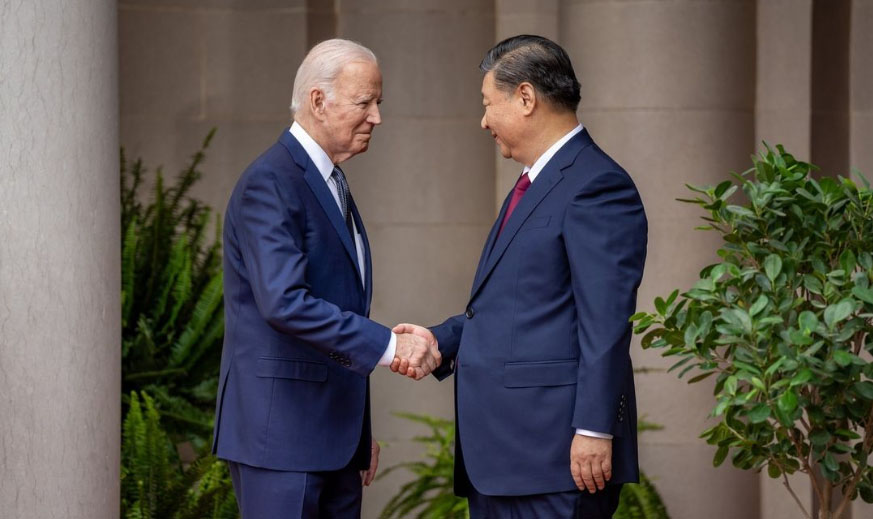
Biden-Xi Rapprochement an Opportunity for Canada to Recalibrate Relations With China
U.S. President Joe Biden’s recent meetings with Chinese President Xi in Woodside, California, were the clearest signal yet that the United States is actively working to mend ties with China. Canada should follow suit.
Biden and Xi had candid and constructive discussions on a range of bilateral and global issues, including areas of potential cooperation and areas of dispute.
Afterwards, President Biden emphasized that the United States and China are in competition, noting that “the United States will continue to invest in the sources of American strength at home and align with allies and partners around the world.” He reiterated that “the world expects the United States and China to manage competition responsibly to prevent it from veering into conflict, confrontation, or a new Cold War.”
President Xi was very candid after meeting with Biden. He said that “the number one question for us is: are we adversaries, or partners? This is the fundamental and overarching issue. The logic is quite simple. If one sees the other side as a primary competitor, the most consequential geopolitical challenge and a pacing threat, it will only lead to misinformed policy-making, misguided actions, and unwanted results,” Xi added, “China is ready to be a partner and friend of the United States,” and stressed that “the fundamental principles that we follow in handling China-U.S. relations are mutual respect, peaceful coexistence and win-win cooperation. I have always had one question on my mind: How to steer the giant ship of China-U.S. relations clear of hidden rocks and shoals, navigate it through storms and waves without getting disoriented, losing speed or even having a collision?”
The Biden-Xi Summit included discussions about increased economic cooperation in trade, economic stability, global financial matters, and a willingness to find common ground on economic fronts where there is competition between the United States and China.
Both leaders committed to working together to address global challenges, particularly on climate change and environmental initiatives. They reinforced their commitment to multilateral institutions and to participating in global forums that promote a rules-based international order. A pivotal outcome was the restoration of high-level communications between the Chinese and American military commands. This was especially important given the tension in the Taiwan Strait for the past three years.
Beijing, in response to American requests, pledged to proactively prevent the export from China of chemicals and pill presses that contribute to the illicit production of the lethal opioid, fentanyl. Both countries agreed to cooperate in combating the global opioid crisis.
The success of the Biden-Xi summit provides a unique opportunity for the Trudeau Liberal government in Canada to recalibrate its approach to China and build a more constructive and collaborative relationship. Failing to do so would not only be a missed opportunity but a serious strategic misstep. Despite the lingering political tensions between Canada and China, largely resulting from the Meng-Two Michaels debacle, the Canada-China relationship remains resilient on several fronts.
China remains Canada’s second-largest trading partner. Canada should build on this foundation by emphasizing increased collaboration in areas of mutual interest, such as renewable energy, technology, and healthcare. Canada can also re-engage with China to increase bilateral cooperation on global challenges like climate change, public health, and global security issues. Canada and China have always emphasized the importance of working within international institutions to address global challenges. Canada should actively participate in multilateral forums alongside China, promoting a rules-based international order. This approach not only enhances diplomatic ties but also ensures that collective action is taken to address shared concerns.
People-to-people connections have always been the bedrock of the Canada-China relationship. Canada should increase cultural exchanges, educational programs, and work to expand tourism initiatives with China. These interactions foster mutual understanding, break down stereotypes, and create lasting connections that transcend political differences.
If Canada makes a concerted and genuine effort to restore its relationship with China in these areas, the current off-kilter political and diplomatic relationship between Canada and China should right itself.
The American decision to make amends with China should awaken officials in the Trudeau government that they too should work to foster a more constructive and cooperative partnership with China. By prioritizing trade, economic collaboration, strategic engagement on global challenges, people-to-people relations and cultural exchanges, Canada can reset its relationship with Beijing and start to rebuild trust.
It is as much in Canada’s interest as it is for the United States to have constructive relations with China, one of the world’s most influential nations.
Photo: @potus











